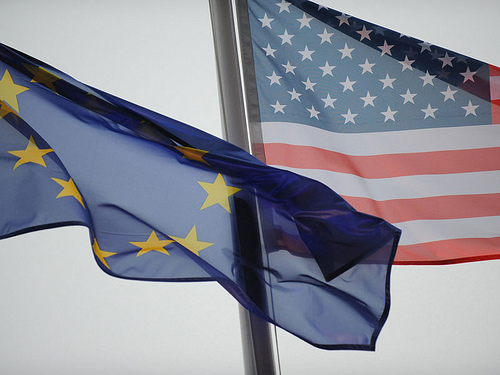
The U.S. warns NATO allies against a quick Afghanistan troop drawdown, and the EU is holding a crisis summit to discuss Libya.
HEADLINES:
U.S. warns NATO nations against rushed Afghan exit (Reuters)
NATO Defense ministers are meeting in Brussels for a two day summit to discuss the events in North Africa, while EU foreign ministers meet ahead of an emergency EU meeting on the same topic. This comes following France’s recognition of the opposition National Council, Gemrany’s decision to freeze Gaddafi’s assets, German and British efforts for a unified EU front, and Gaddafi’s attempts to send envoys to European capitals.
EU Freezes Assets of Five Libyan Entities (Wall Street Journal)
The European Union Friday froze the assets of five Libyan entities, including the central bank and the country’s sovereign-wealth fund,in a further push against the Libyan leader Col. Moammar Gadhafi, according to its Official Journal.
Plain Speaking From Biden in Moscow Speech (New York Times)
Vice President Joseph R. Biden Jr., who two years ago introduced the idea of a thaw between the United States and Russia, used a speech at Moscow State University to criticize Russia’s legal and political systems, a move likely to irritate the country’s leaders.
NATO to move warships closer to Libya, resists military action (Deutsche Welle)
NATO has taken a cautious approach to action in Libya, opting for increased coastal monitoring rather than a no-fly zone. But France has taken a lead, recognizing rebel leaders as Libya’s legitimate government.
Is Euro Summit First Step Toward Economic Government? (Der Spiegel)
The future architecture of Europe’s common currency is starting to take shape. On Friday, leaders of the 17 euro-zone countries are meeting in Brussels to hammer out details of a plan to ensure the stability of the beleaguered euro. German Chancellor Angela Merkel remains under tremendous domestic political pressure to remain tough, but concessions are expected.
EU crisis summit on Libya opens (AFP)
A European Union crisis summit on Libya opened in Brussels on Friday with countries divided over a British-French push to prepare for military action and formal recognition of Moamer Kadhafi’s opponents.
France ‘arrests’ ETA military chief (Al Jazeera English)
French police have arrested Alejandro Zobaran Arriola, the suspected military chief of the armed Basque separatist group ETA, Spanish national radio reported.
Arriola was among four ETA suspects held in an operation on Thursday by French police near the Belgian border, according to the radio report.
NATO endorses plan for security handover to Afghan authorities (The Globe and Mail)
NATO defence ministers on Friday endorsed a list of the first cities and provinces where Afghan police and soldiers will take control of security — a key element in the West’s exit strategy from the decade-old war.
The areas include the provincial capitals of Lashkar Gah, Herat and Mazar-i-Sharif, as well as all of Bamiyan and Panshir provinces, and Kabul province except for the restive Surobi district. The list was provided by officials and diplomats who spoke on condition of anonymity due to the sensitivity of the issue.
2011 Japanese Earthquake and Tsunami Updates
EDITORIALS AND COLUMNS:
Moldova’s Moment (Moscow Times)
When Vice President Joe Biden arrives in Chisinau on Friday, he will be the highest-level U.S. official to set foot in Moldova in its nearly 20 years. A former republic of the Soviet Union, landlocked between Romania and Ukraine, Moldova is the poorest nation in Europe, but it is strategically important for the United States. Biden’s visit can send a strong message of support for Moldova’s economic and democratic development and European ambitions.
Can Angela Merkel hold Europe together? (The Economist)
GERMANY’S chancellor, Angela Merkel, has the future of Europe in her hands. As the biggest creditor country, Germany holds the key to resolving the euro zone’s sovereign-debt crisis. As the continent’s economic giant, it is the biggest determinant of the European Union’s direction. And right now Europe may be embarking on a path that could tilt the union away from economic liberalism, risking a split and, ultimately, even a British exit.
Census in Montenegro – Théâtre de l’Absurde (EUobserver)
In a small European country, aspiring to become a full member of the EU, conducting a census, due in April, should neither provoke a political earthquake nor trigger significant changes in policies related to identity issues.
Image: transatlantic.jpg
